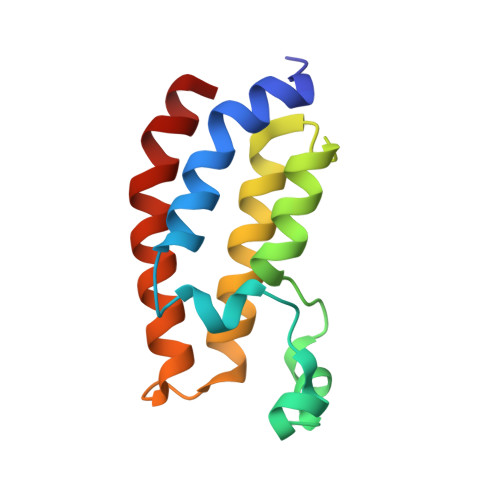Discovery of a Potent and Selective in Vivo Probe (GNE-272) for the Bromodomains of CBP/EP300.
Crawford, T.D., Romero, F.A., Lai, K.W., Tsui, V., Taylor, A.M., de Leon Boenig, G., Noland, C.L., Murray, J., Ly, J., Choo, E.F., Hunsaker, T.L., Chan, E.W., Merchant, M., Kharbanda, S., Gascoigne, K.E., Kaufman, S., Beresini, M.H., Liao, J., Liu, W., Chen, K.X., Chen, Z., Conery, A.R., Cote, A., Jayaram, H., Jiang, Y., Kiefer, J.R., Kleinheinz, T., Li, Y., Maher, J., Pardo, E., Poy, F., Spillane, K.L., Wang, F., Wang, J., Wei, X., Xu, Z., Xu, Z., Yen, I., Zawadzke, L., Zhu, X., Bellon, S., Cummings, R., Cochran, A.G., Albrecht, B.K., Magnuson, S.(2016) J Med Chem 59: 10549-10563
- PubMed: 27682507
- DOI: https://doi.org/10.1021/acs.jmedchem.6b01022
- Primary Citation of Related Structures:
5KTU, 5KTW, 5KTX, 5KU3 - PubMed Abstract:
The single bromodomain of the closely related transcriptional regulators CBP/EP300 is a target of much recent interest in cancer and immune system regulation. A co-crystal structure of a ligand-efficient screening hit and the CBP bromodomain guided initial design targeting the LPF shelf, ZA loop, and acetylated lysine binding regions. Structure-activity relationship studies allowed us to identify a more potent analogue. Optimization of permeability and microsomal stability and subsequent improvement of mouse hepatocyte stability afforded 59 (GNE-272, TR-FRET IC 50 = 0.02 μM, BRET IC 50 = 0.41 μM, BRD4(1) IC 50 = 13 μM) that retained the best balance of cell potency, selectivity, and in vivo PK. Compound 59 showed a marked antiproliferative effect in hematologic cancer cell lines and modulates MYC expression in vivo that corresponds with antitumor activity in an AML tumor model.
Organizational Affiliation:
Genentech, Inc. 1 DNA Way, South San Francisco, California 94080, United States.
















